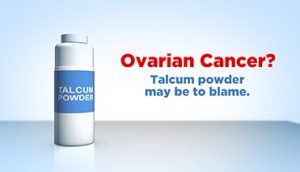
 Women across the United States may now be wondering just how dangerous it really is to sprinkle on powder for feminine hygiene after a shower. The recent court cases against Johnson & Johnson, and the information which has come to light regarding the possible link between talcum powder and ovarian cancer have left women with many questions and few definitive answers. Within the past three months, Johnson & Johnson has been ordered to pay $72 million in a wrongful death case after a woman who used J & J talc powder died of ovarian cancer, as well as $55 million to another woman who says she developed ovarian cancer after using J & J baby powder with talc in the genital region.
Women across the United States may now be wondering just how dangerous it really is to sprinkle on powder for feminine hygiene after a shower. The recent court cases against Johnson & Johnson, and the information which has come to light regarding the possible link between talcum powder and ovarian cancer have left women with many questions and few definitive answers. Within the past three months, Johnson & Johnson has been ordered to pay $72 million in a wrongful death case after a woman who used J & J talc powder died of ovarian cancer, as well as $55 million to another woman who says she developed ovarian cancer after using J & J baby powder with talc in the genital region.
Both of these women claimed to have used J & J baby powder with talc and Shower to Shower with talc for more than three decades. The majority of both the J & J settlements were designated as punitive damages, meaning the jurors believed the company exhibited negligence, primarily in their failure to warn women about the potential risks associated with talc. In a 2013 case, the jury found in favor of the plaintiff, and found Johnson & Johnson negligent, yet awarded no monetary damages.
Studies have shown that there is an increased risk of ovarian cancer when women use talcum products in the genital region. In fact, there is a 30-40% increase in the risk of ovarian cancer. Daniel Cramer and his team at Brigham and Women’s Hospital uncovered this risk and their 2 controlled studies found that there was a 40% increase and a 33% increase in developing ovarian cancer.
Although Johnson & Johnson—as well as some studies—say that talc fibers cannot find their way to the ovaries, other studies say differently. In one study done in the 1970’s, pathologists found talc fibers in the ovarian tissues of nine out of thirteen women diagnosed with ovarian cancer. In theory, when baby powder with talc is used for feminine hygiene, the talc fibers can migrate through the vagina, uterus, fallopian tube and into the ovaries. Once in the ovaries, the talc fibers can cause inflammation and irritation. Since inflammation is a well-known precursor to various types of cancer, the theory does not seem that far-fetched.
If you have been diagnosed with ovarian cancer and are unsure whether your talcum powder use contributed to that diagnosis, the same tissue samples and pathology reports which were used to diagnose your cancer can be examined to determine whether the tissues contain talc fibers. Your attorney can review your medical records thoroughly and send your pathology reports to an expert in talcum powder ovarian cancer.
 If you or someone you love has developed ovarian cancer after using a talc-based product, such as baby powder or Shower-to-Shower, it is important to know that you have legal options. We can help you take part in national lawsuits that are happening all across the country. At Aaron Levine & Associates, our Washington DC-based firm and our talcum powder lawsuit attorneys are ready to help you seek justice. Contact us today for a free initial consultation and review of your case.
If you or someone you love has developed ovarian cancer after using a talc-based product, such as baby powder or Shower-to-Shower, it is important to know that you have legal options. We can help you take part in national lawsuits that are happening all across the country. At Aaron Levine & Associates, our Washington DC-based firm and our talcum powder lawsuit attorneys are ready to help you seek justice. Contact us today for a free initial consultation and review of your case.
